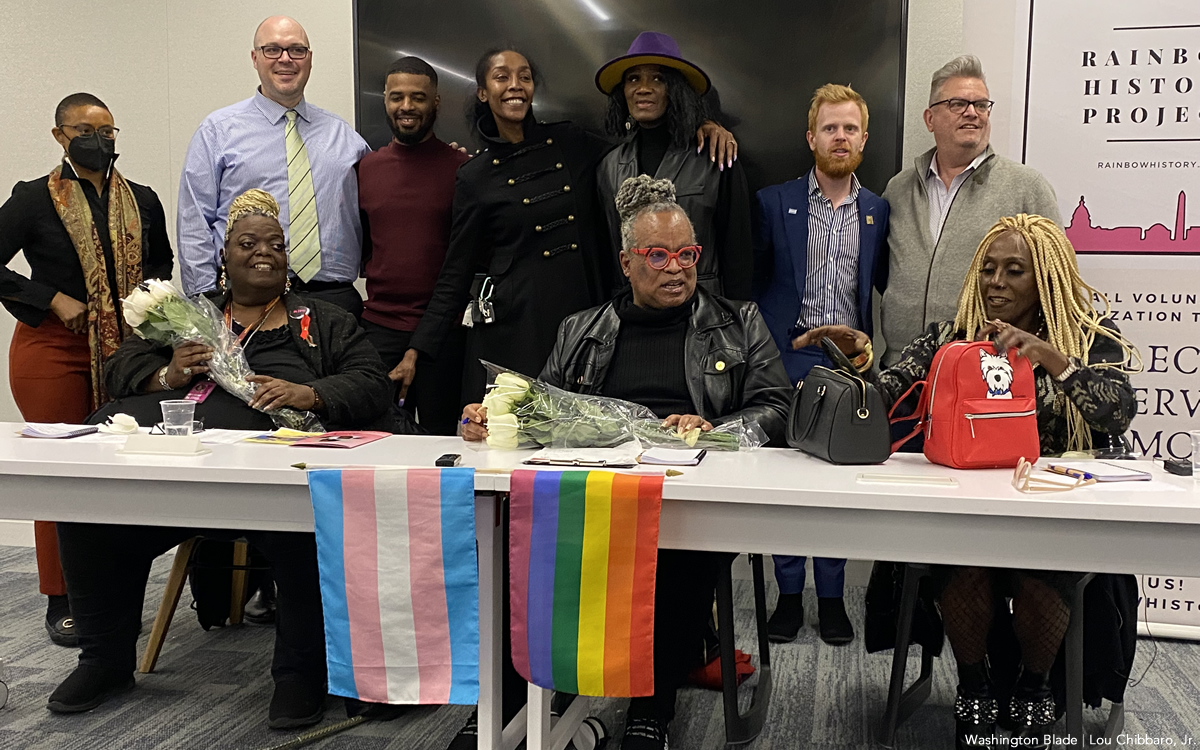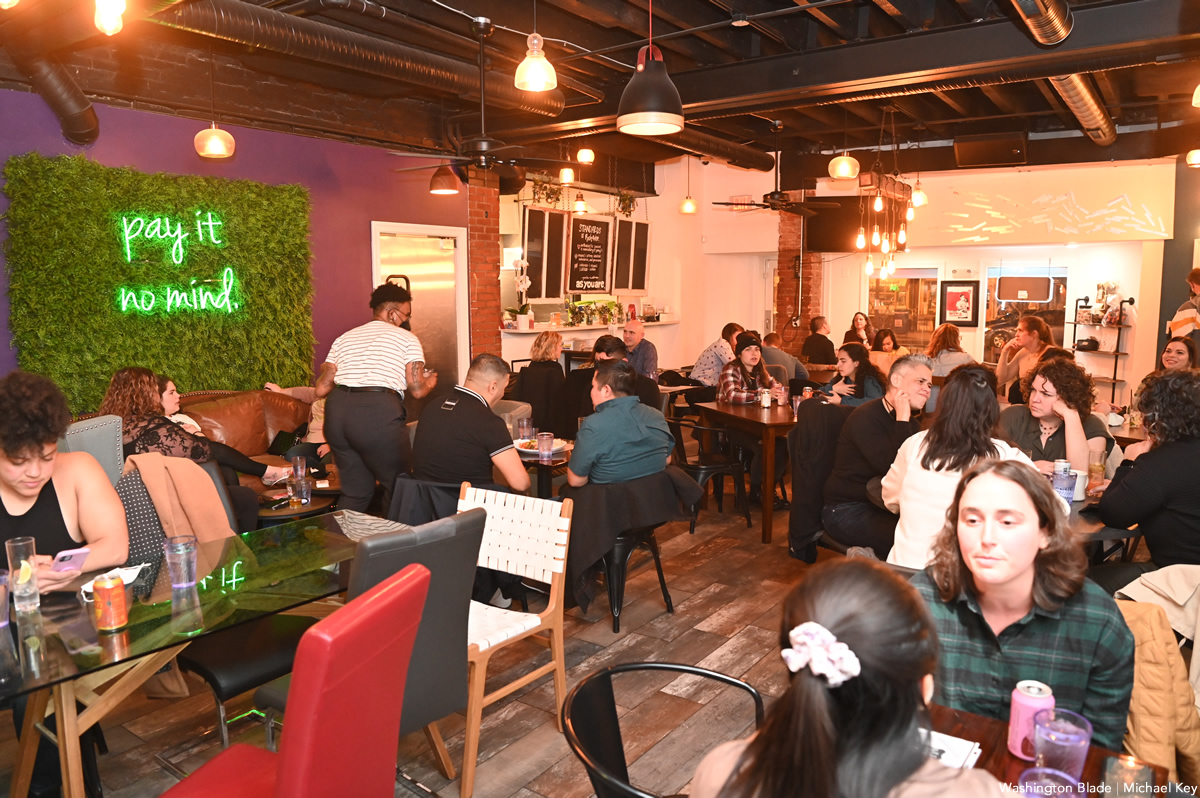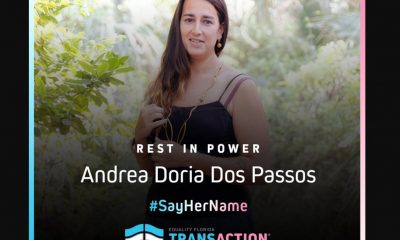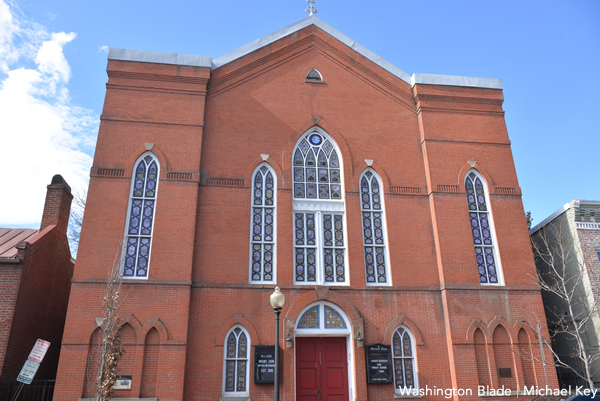District of Columbia
‘Talking Trans History’ explores lives of D.C. advocates
Rainbow History Project holds first panel for city-funded Trans History Initiative

Longtime D.C. transgender rights advocates Earline Budd and Gabrielle ‘Gibby’ Thomas gave personal accounts of their transition as transgender women and their work as trans rights advocates Tuesday night, Jan. 24, at a “Talking Trans History” panel discussion organized by D.C.’s Rainbow History Project.
Joining them as a panelist was Rayceen Pendarvis, the acclaimed local event host, public speaker, and LGBTQ community advocate. Pendarvis, among other things, told of being nurtured and taught by dynamic transgender women who proudly affirmed their identity not only as trans people but productive citizens in the community at large.
Vincent Slatt, Rainbow History Project’s director of archiving, served as moderator of the panel discussion. He told the audience of about 25 people who gathered at the Southwest Branch of the D.C. Public Library that the event was the first of many such panels planned by the project’s recently launched Trans History Initiative.
Slatt noted that Rainbow History Project received a $15,000 grant for fiscal year 2023 from the Mayor’s Office of LGBTQ Affairs to conduct the Trans History Initiative. The initiative plans to “better integrate the often-under-represented histories of trans people into our programming,” according to a RHP statement.
Budd, 64, who has been a trans-identified activist since the 1970s, became involved in the 1980s with supporting people with HIV/AIDS before founding the D.C. organizations Trans Health Empowerment and Empowering the Transgender Community (ETC), for which she currently serves as executive director. She has received numerous awards for her work in support of the trans community and her self-proclaimed role as “the advocate” for the trans and LGBTQ community.
In her remarks at the panel discussion, Budd told of her childhood upbringing in a religious family where, like many trans people, her parents didn’t approve of her early identity as a girl.
“I want to say that around eight or nine my mother found me to be different,” Budd said. “The difference was she would lay my clothes out, my sister’s clothes and my clothes for us to go to school. And when I would come downstairs, I would always have on my sister’s clothes,” Budd told the gathering.
“And she would say why do you have on your sister’s clothes?” Budd continued. “I said mommy, it fits. No, it does not, you’re a boy,” Budd quoted her mother as responding. “And let me tell you, that went on and on and on,” said Budd, who told how she eventually parted ways with her parents and left the house to embark on her role as one of D.C.’s leading trans advocates.
Among her many endeavors was successful discrimination complaints, including one against a D.C. skating rink and another against the D.C. Jail for discrimination based on gender identity. Budd told how she won in both cases, with strong backing from the D.C. Office of Human Rights.
Pendarvis, among other things, spoke about how an association with trans women as a young adult helped to shape Pendarvis’s longstanding and award-winning role as co-founder of Team Rayceen Productions, including 10 years as leading host of “The Ask Rayceen Show,” which highlighted topics promoting the LGBTQ and trans community in D.C.
Similar to Budd, Pendarvis has received numerous awards and honors, including recognition from the D.C. City Council, for work as a host and speaker at LGBTQ-related festivals, fundraisers and other events.
“As an activist and host, I have been blessed to do many things,” Pendarvis told the panel discussion gathering. “For many who do not quite know how to identify or ask me to identify, first of all, I’m a human being,” Pendarvis said. “I am a father of five and a mother of many.”
Pendarvis added, “I’m a human being first and foremost, a child of God. And my trans sisters uplifted me first, embraced me first. I came out in a community where our transgender sisters were always on the front line.”
Thomas, 65, told the panel session she is a native of North Brentwood, Md., located just outside D.C., but D.C. became her home since shortly after finishing high school. She began her work in the LGBTQ community in 1989 as a caregiver for people with HIV. She has since worked for the local organizations Us Helping Us, Transgender Health Empowerment, and Terrific, Inc. She currently works for Damien Ministries and its “Trans Specific” programming called Shugg’s Place that, among other things, focuses on providing services for transgender older adults.
She told of her growing up as one of seven children in a family whose mother and father, she said ‘were very loving.” But like other trans kids, Thomas said her parents were uncomfortable over her desire to identify as a girl. A more understanding next door neighbor allowed Thomas to spend time in her house as Thomas helped with household errands.
“I would go to the store and things like that for her,” Thomas said. “But what’s most important, I could dress as I wanted to in her house. She would give me dresses that I could wear. And I could go up there and put on my dresses and watch TV,” Thomas continued. “And then I would get to take my dress off and go home because mom and daddy wasn’t standing for that.”
At around the age of 10, Thomas said, she was aware of current events and observed that her father was a strong supporter and admirer of Martin Luther King Jr. and his civil rights leadership. “I said you can march with Martin Luther King for everybody else’s rights but you are going to deny me mine,” she recalled telling her father.
Thomas said she initially began patronizing D.C. gay bars after befriending gay men from her high school. A short time later, after realizing that the gay scene was not who she was, she discovered the then D.C. gay drag bars Louis’ and The Rogue and had a chance to meet “people like me.” But she said someone she met at one of those two bars introduced her to the then D.C. Black gay bar called the Brass Rail, where transgender women hung out.
“And I said, oh my God, I am home. This is heaven,” Thomas told the panel gathering. “When I came to the Brass Rail I felt like I was home” as a trans person, Thomas said. “I met so many terrific people.”
She went on to tell about the trials and tribulations of fully transitioning as a trans woman and her growth as a transgender activist with a career dedicated to supporting the trans and LGBTQ community.
Japer Bowles, director of the Mayor’s Office of LGBTQ Affairs, spoke briefly at the start of the Talking Trans History panel discussion. He said the mayor’s office was excited to be supporting the Rainbow History Project’s newly launched Trans History Initiative.
“I’m really, really excited to work for a mayor who not only is fighting for things for our community, but truly funding these opportunities,” Bowles said. “This is about you and our trans communities. So, I’m here to listen.”
Slatt also announced at the panel session that Rainbow History Project has a paid job opening for one or more positions to help run the city funded Trans History Initiative. He said information about the job opening for people interested in applying can be obtained through RHP’s website. He said a video recording of the panel session would be posted on the website in a week or two.
District of Columbia
As You Are bar closes temporarily, citing problems with building
Shutdown comes two months after fundraising appeal brought in $170,000

As You Are, the LGBTQ café and bar located in the Barracks Row section of Capitol Hill near the Eastern Market Metro station, has announced on its Instagram page that problems associated with its building at 500 8th St., S.E., forced it to “temporarily” close on April 8.
“As you may be aware, As You Are’s location in Eastern Market has been closed since April 8, when we began to have concerns about the physical condition of the building,” the Instagram message states. “We worked quickly to alert our landlord, and they have assessed the building with their engineers,” the message says.
“We understand that certain repairs need to be made to ensure the safety of our staff, patrons, and community,” the message concludes.
In one of two more recent videos posted on Instagram on April 17 and 26, As You Are co-owners Jo McDaniel and Rachel Pike said they did not have any update on when they can reopen. “The engineers and contractors have all come into the space, and we’re just waiting on a plan and a timeline from our landlord,” McDaniel said in the video.
Pike mentioned in one of the videos that As You Are has a Venmo app set up, and said they appreciate the support they have been receiving from the community. McDaniel added, “We’re really interested in supporting our team through this, as this is an unexpected loss of income for all of us.”
McDaniel didn’t immediately respond to a request from the Washington Blade for a further update on where things stand with the building repair project and the specific nature of the problems with the building. An earlier message posted on the As You Are website said, “Heavy rain damaged the back wall of our building, and we are closed to assess and repair.”
The message added, “Regular updates and ways to support can be found on our Instagram page @asyouaredc.”
The April 8 shutdown came a little over two months after As You Are issued a GoFundMe appeal on Feb. 5 seeking emergency financial support to prevent it from closing in February due to a $150,000 debt. In a display of strong community support, its $150,000 fundraising goal was reached in less than a week. By the following week, the GoFundMe appeal had pulled in more than $170,000 from more than 3,000 individual donations.
Many of the donors left messages on the GoFundMe page for As You Are expressing their strong support for the bar and café, saying it served as a uniquely supportive space for all members of the LGBTQ community.
In the GoFundMe message, McDaniel and Pike said their goal in opening their business in March 2022 was to offer community center type programming beyond just a bar and café.
“AYA is a café, bar and dance floor that hosts diverse programming nearly every night of the week, including social sport leagues, Queer youth socials, weekly karaoke, book clubs, open mics, Queer author events, dance parties, and much more,” the two said in their message.
The building’s owner and the As You Are landlord, Rueben Bajaj, who is the principal operator of the Bethesda, Md., based real estate firm White Star Investments, couldn’t immediately be reached for comment. The Washington Post reported that he contributed $500 to the As You Are GoFundMe appeal, saying, “I personally want to see As You Are succeed.”
District of Columbia
Weekend brings two shootings in U Street, Dupont Circle areas
Man dies after incident at Desperados

A man was shot to death shortly after 1 a.m. on Saturday, April 27, inside the Desperados Burgers & Bar at 1342 U St., N.W., which is located on the same block a short distance away from the LGBTQ nightclub Bunker D.C. and around the corner less than a block away from the recently opened LGBTQ bar Crush on 14th Street, N.W.
The incident prompted Bunker to post on its Facebook page a message saying its security team quickly ushered patrons standing outside to enter the club and as a precautionary measure prevented patrons from leaving until it was deemed safe to do so.
A D.C. police statement identifies the shooting victim as Kenneth Goins, 43, of Salisbury, Md. The statement says officers on patrol in the 1300 block of U Street, N.W. heard gunshots at about 1:12 a.m. and immediately arrived at Desperados to investigate the incident.
“Officers located a man inside with multiple gunshot wounds,” the statement says. “Despite all life saving efforts, the victim was pronounced dead on the scene,” it says. Neither the statement nor a police incident report pertaining to the shooting provides a description of the person who committed the shooting nor discloses whether any of the customers inside the restaurant and bar witnessed the shooting.
The statement says the police Homicide Branch is investigating the shooting and urges anyone with knowledge of the incident to call police at 202-272-9099. Like all homicide cases, it says the D.C. Metropolitan Police Department offers a reward of up to $25,000 to anyone who provides information that leads to the arrest and conviction of the person or persons responsible for a homicide committed in the District.
“There was a shooting incident on U ST. N.W., just 4 doors down from BUNKER,” the Bunker Facebook post says. “Our security team promptly responded, ensuring the safety of everyone by ushering them inside for cover,” it says. “Currently, the courageous police officers are outside, handling the situation and working diligently to maintain a secure environment for our guests,” the message continues.
“As a responsible establishment, we strongly prioritize your safety, and as a precautionary measure, we will not permit anyone to exit the building until we deem it safe to do so,” the posting says. “Rest assured, we, as the owners, take this matter very seriously, and your safety remains our highest priority.”
The U Street shooting at Desperados Burgers & Bar took place a little over two hours after six people were shot and wounded outside the Decades nightclub at 1219 Connecticut Ave., N.W. near Dupont Circle and near several gay bars on P Street and 17th Street in the Dupont Circle area. Police said none of those who were shot suffered life-threatening injuries
A separate police statement says with the help of several witnesses, police identified and arrested Rennwel Mantock, 29, of Hyattsville, Md., in connection with the shooting on charges of Assault with Intent to Kill, Possession of Unregistered Ammunition, and Possession of an Unregistered Firearm. The statement says a gun belonging to Mantock was recovered on the scene. Court records show a judge has ordered him to be held without bond until a May 7 preliminary hearing.
“The detectives’ investigation determined Mantock opened fire after employees removed him from a nightclub following a dispute,” according to the statement.
A police arrest affidavit filed in D.C. Superior Court says Mantock told police at the time he was apprehended on the scene that he was dancing with a woman at the club when a security guard ordered him to leave and then “grabbed him by the neck and punched him in the face right before dragging him down the steps.” The Decades club states on its website that it has several floors with multiple bars.
According to the arrest affidavit, Mantock told police that one of the security officials punched him in the face again and threw him to the ground after dragging him out the door. It says Mantock “stated that he then pulled out his gun and started shooting” because “he was very upset about the security punching him in the face,” adding that he “began firing at the Decades’ security.”
The affidavit says five of the six people shot were Decades employees.
Gay former Dupont Circle Advisory Neighborhood Commissioner Mike Silverstein, who lives near where the shooting took place, said Decades is not known as a place that LGBTQ people patronize but said the surrounding neighborhood is home to many LGBTQ residents and draws many LGBTQ visitors.
District of Columbia
Catching up with the asexuals and aromantics of D.C.
Exploring identity and finding community

There was enough commotion in the sky at the Blossom Kite Festival that bees might have been pollinating the Washington Monument. I despaired of quickly finding the Asexuals and Aromantics of the Mid-Atlantic—I couldn’t make out a single asexual flag among the kites up above. I thought to myself that if it had been the Homosexuals of the Mid-Atlantic I would’ve had my gaydar to rely on. Was there even such a thing as ace-dar?
As it turned out, the asexual kite the group had meant to fly was a little too pesky to pilot. “Have you ever used a stunt kite?” Bonnie, the event organizer asked me. “I bought one. It looked really cool. But I can’t make it work.” She sighed. “I can’t get the thing six feet off the ground.” The group hardly seemed to care. There was caramel popcorn and cookies, board games and head massages, a game of charades with more than its fair share of Pokémon. The kites up above might as well have been a coincidental sideshow. Nearly two dozen folks filtered in and out of the picnic throughout the course of the day.
But I counted myself lucky that Bonnie picked me out of the crowd. If there’s such a thing as ace-dar, it eludes asexuals too. The online forum for all matters asexual, AVEN, or the Asexual Visibility and Education Network, is filled with laments: “I don’t think it’s possible.” “Dude, I wish I had an ace-dar.” “If it exists, I don’t have it.” “I think this is just like a broken clock is right twice a day type thing.” What seems to be a more common experience is meeting someone you just click with—only to find out later that they’re asexual. A few of the folks I met described how close childhood friends of theirs likewise came out in adulthood, a phenomenon that will be familiar to many queer people. But it is all the more astounding for asexuals to find each other this way, given that asexual people constitute 1.7% of sexual minorities in America, and so merely .1% of the population at large.
To help other asexuals identify you out in the world, some folks wear a black ring on their middle finger, much as an earring on the right ear used to signify homosexuality in a less welcoming era. The only problem? The swinger community—with its definite non-asexuality—has also adopted the signal. “It’s still a thing,” said Emily Karp. “So some people wear their ace rings just to the ace meet-ups.” Karp has been the primary coordinator for the Asexuals and Aromantics of the Mid-Atlantic (AAMA) since 2021, and a member of the meet-up for a decade. She clicked with the group immediately. After showing up for a Fourth of July potluck in the mid-afternoon, she ended up staying past midnight. “We played Cards against Humanity, which was a very, very fun thing to do. It’s funny in a way that’s different than if we were playing with people that weren’t ace. Some of the cards are implying, like, the person would be motivated by sex in a way that’s absurd, because we know they aren’t.”
Where so many social organizations withered during the pandemic, the AAMA flourished. Today, it boasts almost 2,000 members on meetup.com. Karp hypothesized that all the social isolation gave people copious time to reflect on themselves, and that the ease of meeting up online made it convenient as a way for people to explore their sexual identity and find community. Online events continue to make up about a third of the group’s meet-ups. The format allows people to participate who live farther out from D.C. And it allows people to participate at their preferred level of comfort: while many people participate much as they would at an in-person event, some prefer to watch anonymously, video feed off. Others prefer to participate in the chat box, though not in spoken conversation.
A recent online event was organized for a discussion of Rhaina Cohen’s book, “The Other Significant Others,” published in February. Cohen’s book discusses friendship as an alternative model for “significant others,” apart from the romantic model that is presupposed to be both the center and goal of people’s lives. The AAMA group received the book with enthusiasm. “It literally re-wired my brain,” as one person put it. People discussed the importance of friendship to their lives, and their difficulties in a world that de-prioritized friendship. “I can break up with a friend over text, and we don’t owe each other a conversation,” one said. But there was some disagreement when it came to the book’s discussion of romantic relationships. “It relegates ace relationships to the ‘friend’ or ‘platonic’ category, to the normie-reader,” one person wrote in the chat. “Our whole ace point is that we can have equivalent life relationships to allo people, simply without sex.” (“Allo” is shorthand for allosexual or alloromantic, people who do experience sexual or romantic attraction.)
The folks of the AAMA do not share a consensus on the importance of romantic relationships to their lives. Some asexuals identify as aromantic, some don’t. And some aromantics don’t identify as asexual, either. The “Aromantic” in the title of the group is a relatively recent addition. In 2017, the group underwent a number of big changes. The group was marching for the first time in D.C. Pride, participating in the LGBTQ Creating Change conference, and developing a separate advocacy and activism arm. Moreover, the group had become large enough that discussions were opened up into forming separate chapters for D.C., Central Virginia, and Baltimore. During those discussions, the group leadership realized that aromantic people who also identified as allosexual didn’t really have a space to call their own. “We were thinking it would be good to probably change the name of the Meetup group,” Emily said. “But we were not 100% sure. Because [there were] like 1,000 people in the group, and they’re all aces, and it’s like, ‘Do you really want to add a non-ace person?’” The group leadership decided to err on the side of inclusion. “You know, being less gatekeep-y was better. It gave them a place to go — because there was nowhere else to go.”
The DC LGBT Center now sponsors a support group for both asexuals and aromantics, but it was formed just a short while ago, in 2022. The founder of the group originally sought out the center’s bisexual support group, since they didn’t have any resources for ace folks. “The organizer said, you know what, why don’t we just start an ace/aro group? Like, why don’t we just do it?” He laughed. “I was impressed with the turnout, the first call. It’s almost like we tapped into, like, a dam. You poke a hole in the dam, and the water just rushes out.” The group has a great deal of overlap with the AAMA, but it is often a person’s first point of contact with the asexual and aromantic community in D.C., especially since the group focuses on exploring what it means to be asexual. Someone new shows up at almost every meeting. “And I’m so grateful that I did,” one member said. “I kind of showed up and just trauma dumped, and everyone was really supportive.”
Since the ace and aro community is so small, even within the broader queer community, ace and aro folks often go unrecognized. To the chagrin of many, the White House will write up fact sheets about the LGBTQI+ community, which is odd, given that when the “I” is added to the acronym, the “A” is usually added too. OKCupid has 22 genders and 12 orientations on its dating website, but “aromantic” is not one of them — presumably because aromantic people don’t want anything out of dating. And since asexuality and aromanticism are defined by the absence of things, it can seem to others like ace and aro people are ‘missing something.’ One member of the LGBT center support group had an interesting response. “The space is filled by… whatever else!” they said. “We’re not doing a relationship ‘without that thing.’ We’re doing a full scale relationship — as it makes sense to us.”
CJ Higgins is a postdoctoral fellow with the Alexander Grass Humanities Institute at Johns Hopkins University.


















